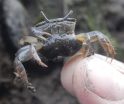Fiddler on the roof?
Northern extension of fiddler crabs' range may be sign of climate change
2014-11-24
(Press-News.org) WOODS HOLE, Mass.--David Johnson was standing in a salt marsh on the northern Massachusetts coast when he saw a fiddler crab, Uca pugnax, nearly 50 miles north of its supposed natural range. The migration north of this charismatic crab with the big, waving claw may be yet another sign of climate change. Johnson, then a scientist at the Marine Biological Laboratory (MBL) Ecosystems Center, has published his observations in the Journal of Crustacean Biology.
The fiddler crab is an attention-getting crustacean; the males have an oversized claw that they use to attract a mate and defend their territory. They can be found scuttling along beaches and marshes all along the U.S. East Coast--except, it was previously thought, north of Cape Cod, Massachusetts, which is the range limit for several warm-water marine species.
Johnson hypothesizes that warmer ocean temperatures in 2012 and 2013, which were 1.3°C higher than the previous decade's average, allowed the crabs to move north. "Climate change is lowering the thermal barriers that kept species from moving toward the poles," he says. Johnson's paper documents the rapid movement of a warm-water species in the typically cold Gulf of Maine.
"When I first saw the crab, I thought, 'You're not supposed to be here,'" Johnson says. After the initial discovery, Johnson found the crabs as far north as Hampton, New Hampshire.
"In terms of climate science, the question used to be, is the climate changing? The answer is a resounding yes. The next question is, 'How will organisms respond?' We are now seeing that one way is by changes in where they are found," Johnson says.
"As the world's oceans continue to warm, we will continue to see climate-driven range expansions," he predicts. "The next question for scientists is, 'What is the impact of these new species on the ecosystems they move into?'"
Johnson recently joined the Virginia Institute of Marine Science as an assistant professor.
INFORMATION:
Citation:
Johnson DS (2014) Fiddler on the roof: A northern range extension for the fiddler crab Uca pugnax. Journal of Crustacean Biology 34:671-673.
The Marine Biological Laboratory (MBL) is dedicated to scientific discovery and improving the human condition through research and education in biology, biomedicine, and environmental science. Founded in Woods Hole, Massachusetts, in 1888, the MBL is a private, nonprofit institution and an affiliate of the University of Chicago.
[Attachments] See images for this press release:


ELSE PRESS RELEASES FROM THIS DATE:
2014-11-24
VIDEO:
The most detailed aerodynamic simulation of hummingbird flight conducted to date demonstrates that it achieves its aerobatic abilities through a unique set of aerodynamic forces more closely aligned to those...
Click here for more information.
The sight of a tiny hummingbird hovering in front of a flower and then darting to another with lightning speed amazes and delights. But it also leaves watchers with a persistent question: How do they do it?
Now, the most detailed, ...
2014-11-24
Over a million US military veterans lacked healthcare coverage in 2012, according to new estimates published in The Lancet. While many people believe that all veterans are covered by the Veterans Affairs health care system, less than half (8.9 million) of the 22 million veterans in the US are covered by VA health benefits, and most veterans are covered by private health insurance. Uninsured veterans are more likely to be young, single, African American, and veterans of Iraq and Afghanistan.
However, the authors of this viewpoint estimate that universal health coverage ...
2014-11-24
There has been a growing concern that modern society is increasingly lonely. In 2006, a New York Times article "The Lonely American Just Got a Bit Lonelier" highlighted research that shows a decline in social engagement--people are less likely to join clubs, have fewer close friends, and are less likely to perceive others as trustworthy. However, studies have also shown an increase in extraversion and self-esteem, which suggests loneliness is decreasing.
In an effort to study the societal trend of loneliness, researchers from the University of Queensland and Griffith ...
2014-11-24
Abnormal connections between neurons are the likely cause of motor coordination issues seen in autism spectrum disorder. Using a mouse model of autism, scientists from the University of Chicago identified a malfunctioning neural circuit associated with reduced capacity for motor learning. This appears to arise from an inability to eliminate unneeded neural connections in the brain. They report their findings Nov. 24 in Nature Communications.
"We have identified synaptic abnormalities that may play a role in motor problems typically seen in children with autism," said ...
2014-11-24
Adult survivors of retinoblastoma, a type of eye cancer that usually develops in early childhood, have few cognitive or social problems decades following their diagnosis and treatment. That's the conclusion of a study published early online in CANCER, a peer-reviewed journal of the American Cancer Society. The findings offer good news for patients, but it's important to continue to monitor for long-term effects as the brain changes throughout life.
While most children with retinoblastoma are successfully cured, little is known about the long-term health of survivors. ...
2014-11-24
ATLANTA--Promoting healthy gut microbiota, the bacteria that live in the intestine, can help treat or prevent metabolic syndrome, a combination of risk factors that increases a person's risk for heart disease, diabetes and stroke, according to researchers at Georgia State University and Cornell University. Their findings are published in the journal Gastroenterology.
The study, a follow-up to the research team's previous paper in Science, uses an improved technical approach, making the results more significant.
The research team includes Dr. Andrew Gewirtz, a professor ...
2014-11-24
A gene associated with schizophrenia plays a role in brain development and may help to explain the biological process of the disease, according to new Rutgers research.
In the study, published in Biological Psychiatry, Bonnie Firestein, professor in the Department of Cell Biology and Neuroscience, says too much protein expressed by the NOS1AP gene, which has been associated with schizophrenia, causes abnormalities in brain structure and faulty connections between nerve cells that prevent them from communicating properly.
Firestein's research indicates that an overabundance ...
2014-11-24
Being in a position of power can fundamentally change the way you speak, altering basic acoustic properties of the voice, and other people are able to pick up on these vocal cues to know who is really in charge, according to new research published in Psychological Science, a journal of the Association for Psychological Science.
We tend to focus on our words when we want to come across as powerful to others, but these findings suggest that basic acoustic cues also play an important role:
"Our findings suggest that whether it's parents attempting to assert authority over ...
2014-11-24
Babies start breathing in the womb, inhaling and exhaling irregularly at first, and then gradually more and more, until the day when they're born and have to do it all the time. But premature babies sometimes have trouble. They stop breathing periodically, sometimes for 20 or 30 seconds at a time. Sometimes they're fine, and sometimes they're not, and doctors struggle to help them. That may soon change, however, thanks to a two-month-old patient at UConn Health with a rare connexin mutation, and his doctor's willingness to call for help. The resulting collaboration between ...
2014-11-24
Repeat suicide attempts and deaths by suicide were roughly 25 percent lower among a group of Danish people who underwent voluntary short-term psychosocial counseling after a suicide attempt, new Johns Hopkins Bloomberg School of Public Health-led research suggests.
The findings are believed to be the first to show that talk therapy-focused suicide prevention actually works, averting future suicide attempts in this very high-risk population. Although just six-to-ten talk therapy sessions were provided, researchers found long-term benefits: Five years after the counseling ...
LAST 30 PRESS RELEASES:
[Press-News.org] Fiddler on the roof?
Northern extension of fiddler crabs' range may be sign of climate change



